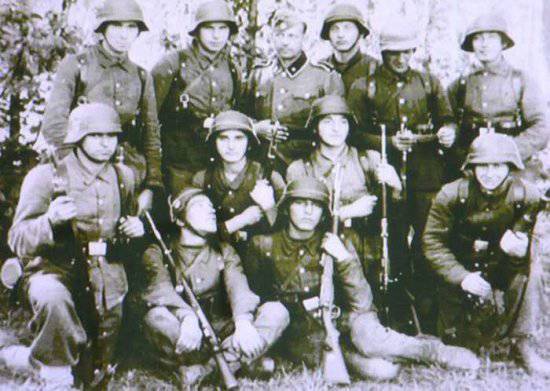Ukrainian SS
28 April 1943 was initiated by the Lviv Governor Vladimir Kubiyovich and the Governor of Galicia, Otto Vechter, and the formation of the division of the Waffen SS “Galicia” began. Now it is called “Galicia”, so we will use this designation, although it was not official. At least 70 thousand Galicians responded to the appeal, of whom fourteen thousand people were found worthy to serve in the SS. The rest of the volunteers also did not stay idle. Germany needed cannon fodder, and all the remaining Galicians were included in the German police. So there were five new police regiments. The oath of the members of the division was the same as that of the other volunteer divisions of the Reich: “I serve you, Adolf Hitler, as the Führer and Chancellor of the German Reich with loyalty and courage. I swear to submit to you to death. God help me! ”
Since we have already started talking about volunteer units in the service of Hitler, then we need to remember that our grandfathers fought not against Germany, but against the united forces of the whole of Europe. First, the industry of the Old World carried out orders Wehrmacht. Secondly, hundreds of thousands of volunteers from almost all countries took part in the crusade against Bolshevism. If I am not mistaken, on the continent only the Serbs and the Greeks fought against the Germans. And Bulgaria, despite being an ally of Germany, did not send troops to the Eastern Front. The rest of the Europeans were under the banner with a swastika. So, only in the SS troops were 400 thousands of non-Germans, and all in all, 1 800 O Oh About volunteers entered the Hitler army. And all this in addition to the official allies of Germany - Italians, Romanians, Hungarians, Finns, Croats, Slovaks. Even officially neutral Spaniards sent to fight the "Blue Division"!
Although many of the officers of the division were Galicians, most of the command posts were occupied by the Germans. The Germans were also the two first division commanders - SS Brigadeführer V. Schiemann and his replacement 20 on November 1943 in the city of F. Freitag.
The new division received a number 14, which has not changed, but the name has changed:
• 14-I Volunteer Division of the SS "Galitsien" (30 June -22 October 1943 g.);
• 14-I Galician SS Volunteer Division (22 October 1943 g. - 27 June 1944 g.);
• 14-I Grenadier Waffen-SS Division (Galician 1 number) (June 27 - November 12 1944);
• 14 Grenadier Waffen SS Division (Ukrainian 1 number) (November 12 1944 - April 25 1945).
Initially, the Galician SS men were engaged in the fight against partisans. For example, in February 1944, the division’s servicemen were included in two “battle groups” that operated against Soviet partisans northeast of Lvov and Polish partisans in the areas of Chesanov and Lyubashov. There is information about the participation of divisions in punitive actions in the Balkans, and Polish researchers claim that divisions of the Halychyna division participated in the guard service in a concentration camp near the town of Dębica, where more than 750 thousands of people were killed. Although it could be other Ukrainian mercenaries.
In April 1944, the division was sent to Neuhammer (Silesia) for further training. In July, 1944, she arrived at the front and joined the battle for the city of Brody. In the first battle, the Galichina division was almost completely destroyed by the troops of the First Ukrainian Front. Of the 14 thousands of soldiers and officers, only 3 thousands survived.
The re-formation began on August 7 of the year at the Neuhammer training ground, where the reserve regiment of the division numbered about 1944 thousand people and volunteers who served in the 8 and 4 of the Galician police regiments, formed from the “excess” of the April set of 5, were sent. of the year.
After the capitulation of Germany, most of the division (about 10 thousand people) broke into Austria, and on May 8, the division surrendered to the British forces at Tamsweg and Judenberg. Unlike most other East European collaboration groups, the division’s employees were not extradited to the Soviet Union.

Information